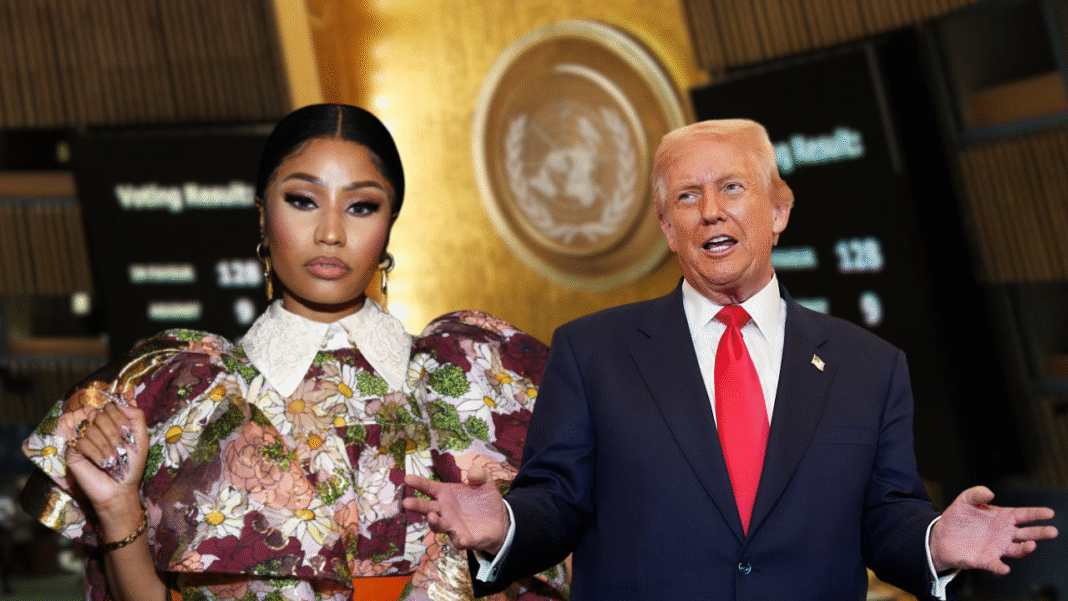The Trump Administration Invites Nicki Minaj for a Discussion on Persecution Claims
In an intriguing turn of events, the Trump administration found itself extending an invitation to renowned rapper Nicki Minaj after she expressed gratitude for President Donald Trump’s statements regarding the alleged persecution of Christians in Nigeria. The invitation came from Mike Waltz, Trump’s U.S. ambassador to the United Nations, who acknowledged Minaj’s influence and the power of her platform.
Praise for Trump’s Stance
Nicki Minaj, whose real name is Onika Maraj, made headlines when she publicly praised Trump for his comments alleging that Christians in Nigeria are facing an “existential threat.” She resonated with his claims that “thousands” have been killed due to their religious identity, marking a moment where the worlds of hip-hop and politics collided. This praise captured the attention of not only her fans but also political figures keen to align themselves with influential voices.
On social media, Waltz expressed his appreciation, saying, “@NICKIMINAJ, thank you for using your platform to speak out in defense of the Christians being persecuted in Nigeria. We cannot allow this to continue. Every brother and sister of Christ must band together and say, ‘Enough!’” His invitation to Minaj to visit the U.S. Embassy in New York City underscored the administration’s desire to engage with influential personalities on international issues.
The Invitation: An Open Dialogue
The invitation extended by Waltz was not merely ceremonial; it aimed to foster constructive dialogue around the administration’s actions to protect religious freedoms globally. Waltz emphasized the importance of connecting with individuals like Minaj, who have vast platforms to raise awareness about complex global issues.
He continued, “If you ever find yourself in New York, come by the US Embassy to the United Nations. I would love to speak with you in more depth about what our administration is doing to protect Christians’ freedoms all over the world.” This not only opened the door for possible discussions but highlighted a strategic objective of leveraging celebrity influence for political narrative purposes.
Nigeria’s Response: A Different Narrative
While the Trump administration’s portrayal of the situation in Nigeria attracted attention, the Nigerian government sharply rejected claims of widespread persecution against Christians. Reports from trusted news sources like the Associated Press cast doubt on the notion that Christians are being systematically targeted. Instead, the reality in Nigeria shows a more complex tapestry of violence affecting both Christian and Muslim communities.
In fact, Nigeria has experienced deep-rooted conflicts, often with religious and ethnic dimensions, stemming from competition over dwindling resources between farmers and herders. According to experts, the majority of violence and victims in Nigeria’s Muslim-majority north tend to be Muslims themselves, complicating the narrative of a singular religious persecution.
Nigerian Information Minister Idris Muhammed remarked that there is “no systematic, intentional attempt either by the Nigerian government or by any serious group to target a particular religion.” This commentary reflects a broader rejection of the narrative being promoted in some Western circles.
Criticism of Trump’s Claims
Further criticism came from Nigerian President Bola Tinubu’s spokesperson, who suggested that Trump and other Republican leaders were relying on outdated reports from more than a decade ago, rooted in the early insurgency of Boko Haram. As the landscape in Nigeria evolves, the relevance of historical claims about religious persecution is being challenged, urging a more nuanced conversation about current conditions on the ground.
Backlash Against Minaj
The fallout from Minaj’s comments was immediate and robust, as many critics emerged to challenge her support for the Trump administration. Facing significant backlash over her praise, Minaj defended her position in a now-deleted post, emphasizing the ability to empathize with those suffering persecution regardless of political affiliations.
“Imagine hearing that Christians are being persecuted & not being able to have empathy for THEM b/c you are blinded by your own personal obsession with Trump,” she wrote. Her response encapsulated the division that often characterizes discussions around political issues, particularly when intertwined with celebrity culture.
A Glimpse into Political Influences
This intersection of hip-hop and politics not only illustrates how celebrity figures can shape discussions on international issues but also highlights the challenges of effectively conveying complex narratives. Minaj’s engagement with the Trump administration may take on various meanings depending on one’s political lens, ensuring that the conversation remains dynamic and often contentious.
As public figures exchange ideas with politicians, the implications reach deep into both cultural discourse and policy-making, showcasing the multifaceted nature of today’s socio-political landscape.



